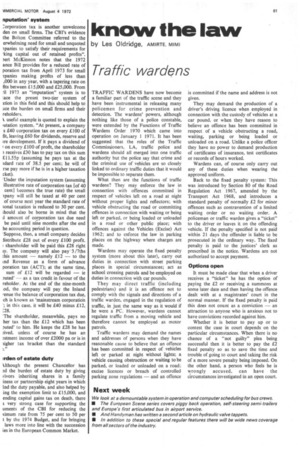know the law
Page 63

If you've noticed an error in this article please click here to report it so we can fix it.
by Les Oldridge, AMIRTE, MIMI
Traffic wardens
TRAFFIC WARDENS have now become a familiar part of the traffic scene and they have been instrumental in releasing many policemen for crime prevention and detection. The wardens' powers, although nothing like those of a police constable, were extended by the Functions of Traffic Wardens Order 1970 which came into operation on January 1 1971. It has been suggested that the roles of the Traffic Commissioners, LA, traffic police and wardens should all merged into one traffic authority but the police say that crime and the criminal use of vehicles are so closely linked to ordinary traffic duties that it would be impossible to separate them.
What then are the functions of traffic wardens? They may enforce the law in connection with offences committed in respect of vehicles left on a road at night without proper lights and reflectors; with vehicle obstructing the road or committing offences in connection with waiting or being left or parked, or being loaded or unloaded in a road or other public place; with offences against the Vehicles (Excise) Act 1962; and to enforce the law in parking places on the highway where charges are made.
Wardens may operate the fixed penalty system (more about this later), carry out duties in connection with street parking places in special circumstances; act as school crossing patrols and be employed on duties in connection with car pounds.
They may direct traffic (including pedestrians) and it is an offence not to comply with the signals and directions of a traffic warden, engaged in the regulation of traffic, in just the same way as it would if he were a PC. However, wardens cannot regulate traffic from a moving vehicle and therefore cannot be employed as motor patrols.
Traffic wardens may demand the names and addresses of persons when they have reasonable cause to believe that an offence has been committed in respect of vehicles left or parked at night without lights; a vehicle causing obstruction or waiting to be parked, or loaded or unloaded on a road; excise licences or breach of controlled parking zone regulations — and an offence is committed if the name and address is not given.
They may demand the production of a driver's driving licence when employed in connection with the custody of vehicles at a car pound, or when they have reason to believe an offence has been committed in respect of a vehicle obstructing a road, waiting, parking or being loaded or unloaded on a road. Unlike a police officer they have no power to demand production of certificates of insurance, test certificates or records of hours worked.
Wardens can, of course only carry out any of these duties when wearing the approved uniform.
Back to the fixed penalty system: This was introduced by Section 80 of the Road Regulation Act 1967, amended by the Transport Act 1968, and introduces a standard penalty of normally £2 for minor offences such as contravention of a limited waiting order or no waiting order. A policeman or traffic warden gives a "ticket" to the driver or leaves it. on the offending vehicle. If the penalty specified is not paid within 21 days the offender is liable to be prosecuted in the ordinary way. The fixed penalty is paid to the justices' clerk as prescribed in the notice. Wardens are not authorized to accept payment.
Options open It must be made clear that when a driver receives a "ticket" he has the option of paying the £2 or receiving a summons at some later date and then having the offence dealt with at a magistrates' court in the normal manner. If the fixed penalty is paid this does not count as a conviction — an attraction to anyone who is anxious not to have convictions recorded against him.
Whether it is better to pay up or to contest the case in court depends on the particular circumstances. When there is no chance of a "not guilty" plea being successful then it is better to pay the £2 fixed penalty so as to save the time and trouble of going to court and taking the risk of a more severe penalty being imposed. On the other hand, a person who feels he is wrongly accused, can have the circumstances investigated in an open court.








































































































